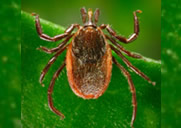We are seeing a lot of tick-borne diseases here in the Midcoast area. Lyme Disease continues to be common but I've had several patients with anaplasmosis, another illness carried by the same deer ticks (and, fortunately, treated by the same antibiotic, doxycycline). Babesia, a parasite that causes a malaria-like illness is also in our area. Babesiosis can be challenging as it requires more expensive testing to diagnose and treating it requires two medications that are different than those used to treat Lyme.
Ticks have to be attached for quite a while to transmit Lyme Disease so daily tick checks reduce that risk. In areas like Knox County that have a lot of Lyme-infected ticks, a single prophylactic dose of doxycycline for non-pregnant adults and children over 8 years can reduce the risk of Lyme from a deer tick that has been attached more than 36 hours. We keep a small bottle of doxycycline in the office for these cases.
To prevent anaplasmosis, ehrlichiosis and babesiosis as well as Lyme, take steps to reduce the risk of a tick bite. Light colored clothing, DEET insect repellant on exposed skin and permethrin insecticide on the outside of clothing can reduce your risk. Tucking long pant legs into socks can be a fashion risk but keeps ticks from crawling up under pant legs. The CDC has several pages of advice for this on their website: http://www.cdc.gov/features/stopticks/
For iPhone, iPad and Android phone users, they also have a nice app for this: http://www.cdc.gov/mobile/applications/MobileFramework/tickborne-diseases.html
If you or others come down with a fever, a flu-like illness, rash, joint pains or other symptoms during the summer, keep tick-borne illnesses in mind and contact your physician. The CDC also has good information on that: http://www.cdc.gov/ticks/symptoms.html
If calling and talking with your own physician is a challenge or it is difficult or expensive to get a convenient appointment, consider a Direct Primary Care practice.

